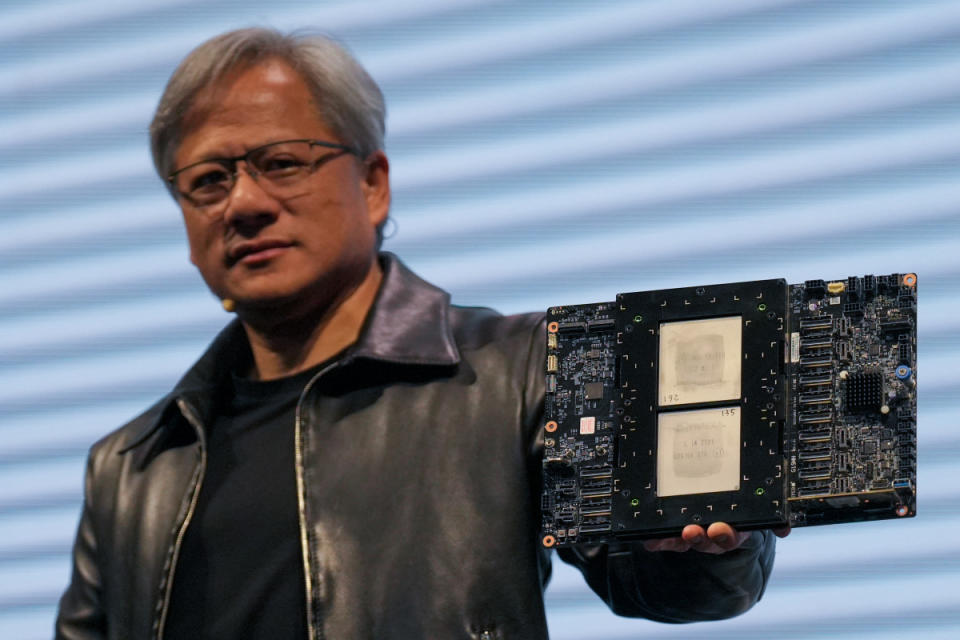Nvidia stock analyst flags worrisome trend
This revolution runs on chips.
In May, Jensen Huang, president and CEO of chip-making behemoth Nvidia (NVDA) , told analysts that "the next Industrial Revolution has begun."
Related: Nvidia stock tumbles in tech slump amid questions over key chip
"Companies and countries are partnering with Nvidia to shift the trillion-dollar installed base of traditional data centers to accelerated computing and build a new type of data center, AI factories, to produce a new commodity, artificial intelligence," he said during the company's earnings call.
"AI will bring significant productivity gains to nearly every industry and help companies be more cost- and energy-efficient while expanding revenue opportunities," Huang said.
Nvidia, which is scheduled to report second-quarter earnings later this month, has seen spectacular growth in its data center business.
The company said its first-quarter data center revenue totaled $22.6 billion, up 23% from the previous quarter and a stunning 427% from a year ago.
Chief Financial Officer Colette Kress told analysts that the results were driven by continued strong demand for the Hopper GPU computing platform.

SOPA Images/Getty Images
Concerns about new chip
"Strong sequential Data Center growth was driven by all customer types, led by enterprise and consumer Internet companies," she said.
"Large cloud providers continue to drive strong growth as they deploy and ramp Nvidia AI infrastructure at scale and represented the mid-40s as a percentage of our data center revenue."
Related: A veteran Wall Street trader just bought some Nvidia stock after its crash
Kress noted that Nvidia supported Tesla's (TSLA) expansion of their training AI cluster and added, "We expect automotive to be our largest enterprise vertical within Data Center this year, driving a multibillion revenue opportunity across on-prem and cloud consumption."
Things have changed since May, and Nvidia's shares took a major tumble this week amid a major pullback in global tech stocks and reports of a delay in delivering its newly designed Blackwell AI chips.
Nvidia unveiled the Blackwell line of processors earlier this year. The company has said the flagship chips perform artificial-intelligence tasks at more than twice the speed of its current Hopper chips while using less energy and providing more bespoke flexibility.
Tech-focused news outlet The Information reported that Nvidia had told Microsoft (MSFT) and an unnamed cloud-service provider client that a design flaw had been found in the Blackwell architecture, which could delay its production ramp and delivery dates by around three months.
AI demand and Nvidia's commanding market share are predicted to drive the company's data center revenue as high as $150 billion next year, powered largely by this year's Blackwell launch.
Min Joo Kang, ING Group’s senior economist in South Korea and Japan, said that Asia's AI-chip trade growth has been booming.
“The most remarkable thing about Northeast Asian economies – South Korea, Japan, and Taiwan – is the robust growth in exports fueled by an upswing in the global tech cycle,” she wrote last month. “Strong demand for AI-related semiconductors and their equipment is the main driver here, supporting overall economic growth."
Analysts review export data
China and Hong Kong still take center stage in the semiconductor industry, Kang added, while South Korea’s trade in volume terms with China and Hong Kong has been shrinking since 2022.
Analysts at Wells Fargo recently reviewed export statistics from Taiwan.
They highlighted automated data processing machines as a data point historically correlated with Nvidia's data center revenue.
More AI Stocks:
Nvidia stock tumbles in tech slump amid questions over key chip
Apple earnings top forecasts, iPhone sales slip ahead of AI launch
Automated data processing refers to computers and other communications electronics that can gather, store, manipulate, prepare and distribute data.
Taiwan Semiconductor Manufacturing Co. (TSM) , the world's largest independent semiconductor foundry, is also Nvidia's largest supplier.
Wells Fargo said that Taiwanese exports of automated data processing machines in July totaled roughly $9.060 billion, up 85.5% year over year and 36% month over month.
This compares to May and June exports up 324% and 135% year-over-year, respectively, the firm said.
While the July data reflects a strong uptick compared with slower trends in May and June, the firm thinks investors may be more focused on the three-month period ending July than on Nvidia data center results.
The release of the July exports leaves total exports for the three months ending July at $21.25 billion, up 141% year-over-year and down 4.6% quarter-over-quarter.
Based on this historical correlation, this data would imply Nvidia's second-quarter 2025 data center revenue of about $23 billion, which is slightly below Wells' $24.6 billion estimate and Wall Street’s estimate of about $25 billion.
Earlier this week, New Street upgraded Nvidia to buy from neutral with a $120 price target.
Since the peak seen in June, Nvidia's stock has pulled back by 26%, underperforming most other semiconductor stocks exposed to data center AI, the firm said.
While New Street finds the correction "healthy overall" and recognizes some limited and tactical headwinds specific to Nvidia, it views the pullback as "an opportunity to gain more exposure," the firm said.
Related: Veteran fund manager sees world of pain coming for stocks
